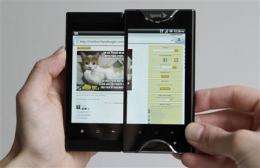Review: Dual-screen Kyocera smartphone needs work

From emailing to Web surfing to taking photos, a smartphone can be a multitasker's best friend - unless all the tasks are making the screen feel too small. Wouldn't it be nice to have a second screen?
The Kyocera Echo, a new Android smartphone sold by Sprint, brings that neat idea to life. Simply slide over the touch screen to reveal a second, identical one.
You can use the two screens independently - for example, respond to an email on the top screen by typing on the virtual keyboard that fills the bottom display.
Or lock the two screens together for a display that is twice as large when watching videos or playing games.
The concept is a great one, but Kyocera Corp.'s execution is flawed.
The most obvious problem is the black frame surrounding each 3.5-inch screen. This results in a distracting black bar bisecting the two screens when they're side by side. It's nearly impossible to watch videos or view photos across the displays without staring at the dark line running down the middle.
And if you turn the phone so the screen is split horizontally, you'll only be watching a video on the top screen.
The rest of the phone's design could also use some work. It's nearly as thick as two iPhones stacked on top of each other, and it's much heavier than an iPhone. This girth, combined with its rectangular shape, makes the Echo look dated.
Then there's the hinge. To reveal the second screen, you must slide the first screen to the right and push it down. You can then tilt it upward or, if you want to have one big screen, slide it slightly back to the left to lock it into place. The whole process felt too clunky, and I kept worrying I would break the hinge.
And expect to use your Echo as, well, a phone - not just because calls sound decent, but because it drains battery quickly when used for Web surfing and other data-heavy tasks.
At first, I was delighted to see that it came with a second battery. I should have been suspicious.
In my first test at running down the battery, the phone made it through barely three-and-a-half hours of talking, Web surfing, streaming videos, instant messaging and gaming on one or both screens before emitting a sad-sounding buzz and shutting down.
I tried again, this time using just one screen, and got almost four hours. Sprint's website says the Echo will get up to seven hours of talk time on a charge, but that's not much help if you're also planning to look up directions, check email and download apps.
The phone, which costs $200 after rebate with a two-year service contract, would benefit from a software update, too. It comes with version 2.2 of Google Inc.'s Android software, which is available on plenty of other handsets but isn't the latest version for smartphones. Sprint says the update will come later in the year, and this should make the phone a little faster overall.
Speaking of software, the Echo ought to have been preloaded with Kyocera's free Tablet Mode Extension app. That's the tool you need before an app will splash itself across both screens (not all apps work with both screens, though). It's easy enough to download from Google's Android Market, but the phone should have come with it.
Despite the annoyances I found, there are some neat things you can do with the Echo's two displays.
The bottom screen functioned as a good virtual keyboard when I was texting or instant messaging, helped by the inclusion of Swype's finger-sliding typing software. I liked being able to open webpages on the larger display, and as long as I kept the phone oriented with the split horizontal, it didn't really disrupt my reading (scrolling was sometimes hampered, though).
It was fun to have my "hard news" open on one screen and gossip website open on another - just one more way I can stay fully informed.
There are a number of different tasks you can do simultaneously, including calling, Web surfing, e-mailing, watching videos and texting.
If your multitasking involves using Sprint's network, however, it won't be blazingly fast. Unlike a number of other Sprint phones, the Echo does not work on the company's newer "4G" network, so you'll have to make do with 3G or connect to a strong Wi-Fi hotspot for data-intense activities.
And on top of a regular monthly charge of at least $70 for voice and data services, you'll also pay the $10 per month data fee Sprint imposed on new smartphones earlier this year (it already applied this charge to its "4G" smartphones).
The Echo has an intriguing premise, but right now it simply doesn't hold up as a multitasking companion.
©2010 The Associated Press. All rights reserved. This material may not be published, broadcast, rewritten or redistributed.





















